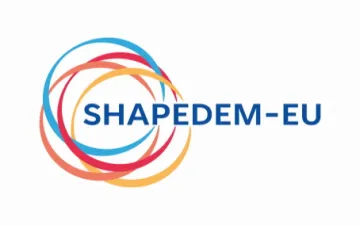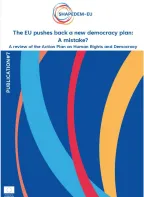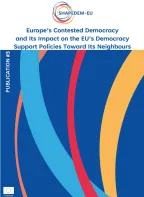SHAPEDEM-EU
Rethinking and Reshaping the EU’s Democracy Support in its Eastern and Southern Neighbourhood
The project sets out to rethink, reshape, and review the EU’s democracy support policies in its Eastern & Southern Neighbourhoods. Conceiving democracy support as a social practice requiring the collective democractic learning of all stakeholders involved, the project’s consortium will pilot test a Democracy Learning Loop to create new channels and tools for interaction between the EU and its neighbours.

Amidst the increasing contestation of the EU and the weakening impact of its policies on democracy support practices in the Southern and Eastern Neighbourhoods, SHAPEDEM-EU applies an entirely novel approach to democracy support: one that defines democracy support as a discursive and behavioural social practice.
The project, which is composed by a consortium of 12 multifaceted research entities and civil society organisations based in the EU and its Southern and Eastern Neighbourhoods, will pilot test a Democracy Learning Loop to create new channels and tools for interaction between the EU and its neighbours and transfer these findings into policy recommendations for an improved EU policy toolkit.
The team will collect, assess, and generate policies related to democracy support in six case countries: Lebanon, Palestine, Tunisia, Ukraine, Georgia, and Armenia. Applying a mixed-methods approach, researchers will investigate the role of EU member states, key EU institutions, third country actors, and international organisations. In all project phases the impact of gender equality & digital transformations in democracy support will be examined. The project results will be communicated and disseminated through SHAPEDEM-EU’s comprehensive Democracy Support Database and an online Digital Dashboard.
CIDOB will lead the Work Package dedicated to non-EU external actors to assess the visions and capacities of these international actors (such as US, China or the UN) in support of democracy or autocracy promotion in the Eastern and Southern Neighbourhoods. Concretely the team will map their priorities and policies in the region, analyse the impact of global and regional geopolitical shifts and tensions and assess the impact of the external actors’ policies on local political dynamics. A policy paper on international alliances for the EU will summarise the findings from this Work Package. In addition, CIDOB will contribute to research under several other Work Packages.
Coordinator:
Justus Liebig University Giessen (JLU)
Partners:
- Carnegie Europe Foundation (CEF)
- Istituto Affari Internazionali (IAI)
- Roskilde University (RUC)
- Barcelona Centre For International Affairs (CIDOB)
- Jagiellonian University (JUK)
- National University of Kyiv-Mohyla Academy (NaUKMA)
- American University of Beirut (AUB)
- Le Secrétariat du Comité de Pilotage du Forum de la Société Civile du Partenariat Oriental (EAP-CSF)
- Kawakibi Democracy Transition Center (KADEM)
- European Research And Project Office Gmbh (EURICE)
- The University Of Warwick (UoK)
Financed by:
European Research Executive Agency
Horizon Europe research and innovation funding programme of the European Union

Team

Pol Morillas

Carme Colomina Saló

Pol Bargués

Moussa Bourekba

Samuele Carlo Abrami

Héctor Sánchez Margalef

Inés Arco Escriche

Oriol Farrés




